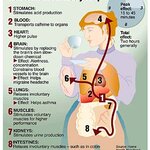
A team of Vanderbilt University Medical Center investigators say they have cracked one of clinical medicine's enduring mysteries – namely, why the once-effective tuberculosis vaccine no longer prevents the bacterial lung infection that kills more than 1.7 million people worldwide each year.
The solution could lead to an improved TB vaccine and also may offer a novel platform for vaccines against other pathogens.
The current TB vaccine, known as BCG (bacille Calmette-Guérin), has been around since the 1920s. It was made by weakening (attenuating) a strain of bacteria that causes…
